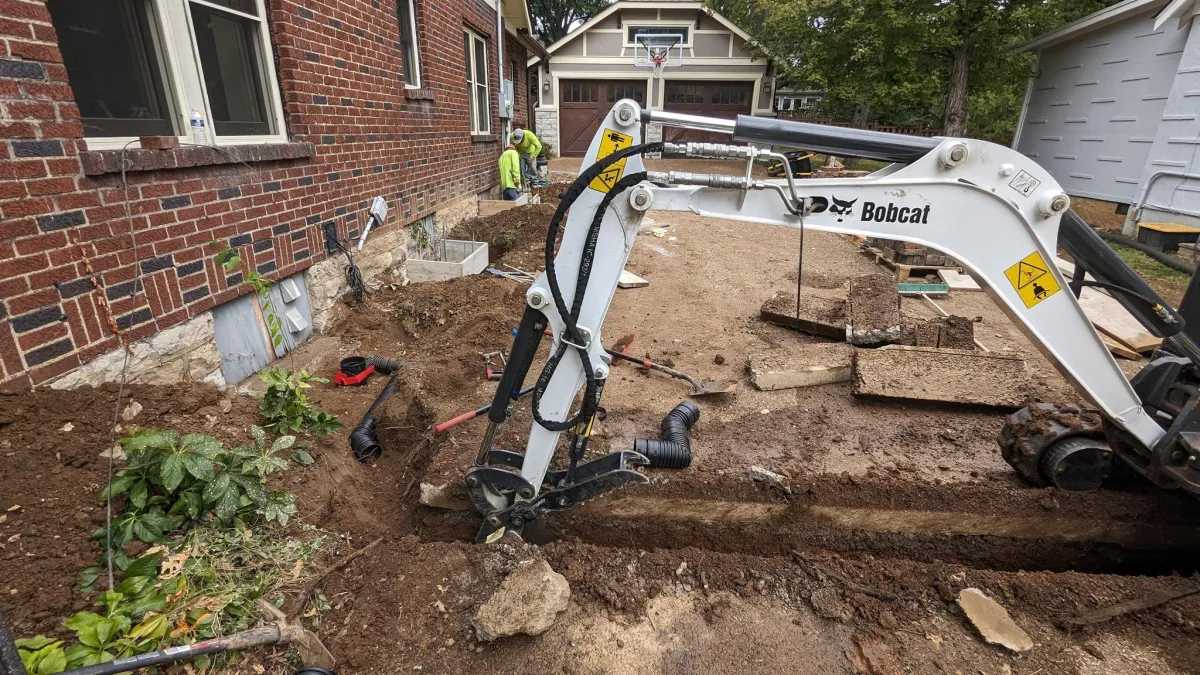Licensed, Bonded & Insured | Family Owned & Operated
049-012803 IL | IL Pumping License: 054-021753 | IA Pumping License: 12839
22 YRS. EXPERIENCE, FULL SITE PREP EXPERTS - HOW CAN WE HELP?

Everything You Need to Know for Basement Excavation near Rock Island County, IL
You’re probably staring at a set of plans and a blank yard, wondering, “How deep will we dig? How long will this take? How much will it cost—and what could go wrong?” If you’re like most homeowners we meet, you want more space, better resale value, and a basement that stays dry for decades. You also don’t want surprise bills, schedule slips, or muddy chaos. We get it. We’re Triple D Excavating Co. in Orion, IL, serving Rock Island, Henry, Knox, Mercer, and Muscatine Counties, and our job is to turn uncertainty into a clear plan.
Below is everything you need to know, so you can move forward with confidence.

Is a Basement Worth It? Value, Resale, and Space Payoff in Illinois Homes
A basement adds livable space without growing the footprint. That matters in neighborhoods where lot lines are tight or setbacks are strict. In Rock Island County and nearby counties, finished basements are popular for guest rooms, kids’ hangouts, home gyms, and storm-safe storage. A well-built basement can:
Add hundreds of square feet at a lower cost per square foot than a full second story.
Boost resale because buyers love flexible space that’s already insulated and dry.
Improve mechanical layout—furnace, water heater, and storage live downstairs, freeing the main level.
If you plan to stay, it’s comfort and breathing room. If you plan to sell, it’s a strong value story—as long as the dig, drainage, and structure are done right.
Basement Excavation Costs in Rock Island County, IL: Full Breakdown and Budget Tips
Every site is different, but here’s what typically drives cost:
Soil conditions: Clay, rock, or fill dirt change how fast we can dig and how we support the walls.
Water management: High water tables or wet seasons may require dewatering systems and more robust drain tile.
Access: Tight lots and narrow drives slow production and may require smaller machines or extra hauling.
Depth and footprint: Deeper digs and larger basements mean more excavation, shoring, and haul-off.
Spoils handling: Reusing soil onsite saves money; hauling and dumping adds trucking and landfill fees.
Code requirements: Egress windows, frost depth, and local standards affect labor and materials.
Budget tips:
Finalize the layout early—changes mid-dig cost more.
Plan your spoils: can we reuse dirt for grading?
Ask for a line-item proposal with allowances.
Keep a small contingency (5–10%) for surprises like buried debris or unexpected rock.
Permits and Codes for Basement Excavation near Rock Island County, IL
You’ll need the right permits before we touch the soil. We coordinate with your builder and the local authority having jurisdiction (city, township, or county). Expect checks on:
Setbacks, easements, and lot coverage
Foundation depth and wall specs
Egress window openings
Drainage and sump discharge location
Inspections will happen at key stages (footings, foundation walls, sometimes drain tile) to keep everything on-spec and on-record.
Soil, Slope, and Water Table: How Local Conditions Shape Your Excavation Plan
Our region sees a mix of loam, clay, and pockets of rock. Slope determines how we bench or shore the walls. Water table and seasonal moisture set the tone for dewatering needs. Before we dig, we study:
Soil type (how it holds or sloughs)
Existing grade (where water naturally wants to go)
Nearby trees (roots and future soil movement)
Neighboring basements (clues about water behavior)
This isn’t guesswork—we read the lot like a story so you don’t pay for avoidable problems later.
Site Access and Equipment: What It Takes to Bring Big Machines to Tight Lots
Even a modest basement requires serious iron: excavators, loaders, and trucks. On narrow streets or tight lots, we plan routes that protect lawns, driveways, and trees. We may use mats, compact equipment, or phased digging to reduce impact. Clear access lets us dig faster, safer, and cheaper.
Utility Locates and Safety: JULIE, Mark-Outs, and Dig-Safe Rules in Illinois
Before digging, JULIE (811) marks underground utilities—gas, electric, water, sewer, and telecom. We also verify private lines (sprinklers, yard lighting, septic laterals). No paint on the ground? No digging. Safety isn’t optional.
Excavation Methods Explained: Cut, Haul, Shoring, and Underpinning Basics
Cut: Removing soil to design depth and shape.
Haul: Moving excess spoils offsite or stockpiling for backfill.
Shoring/Benching: Supporting the excavation so walls don’t cave.
Underpinning: Supporting an existing structure (like a nearby garage) when soil is removed.
We choose the safest, most efficient method based on your lot, soil, and foundation design.
Water Management 101: Dewatering, Drain Tile, Sumps, and Waterproofing Layers
Water is the basement’s lifelong rival. We design for it from day one:
During the dig: Pumps and trenches control groundwater and rain.
At the foundation: Clean stone base, perimeter drain tile, filter fabric, and a sump to move water away.
On the walls: Waterproofing membranes and protection boards—no shortcuts.
At the surface: Grading that slopes away, downspout extensions, and smart landscaping.
A dry basement isn’t luck—it’s layers working together.
Foundations That Last: Footings, Walls, Backfill, and Compaction Done Right
Footings carry the load; we dig to undisturbed soil and proper frost depth.
Walls (poured or block) follow engineer specs and local code.
Backfill waits until the structure reaches required strength and, if needed, is braced.
Compaction happens in lifts so soils don’t settle later and crack patios or walks.
We keep records so you have proof of what’s beneath your feet.
Egress Windows and Walk-Outs: Design, Code, and Cost Considerations
Bedrooms in the basement need egress—a safe way out. That means well openings, clear dimensions, and proper drainage at each opening. Walk-out basements can add natural light and easy access, but require grading plans and retaining wall considerations. Getting these right now avoids rework later.
Rock, Clay, and Fill Dirt: Handling Hard Digs and Unexpected Soil Problems
Rock: Slows production and may require special teeth or breaking.
Heavy clay: Holds water and can become slick; we manage it with timing and ground protection.
Fill dirt/debris: Old stumps, buried concrete, or trash may appear. We remove it and replace with approved structural fill where needed.
These aren’t “uh-ohs” to us—they’re common and manageable with the right plan.
Timeline and Milestones: From First Call to Backfill in Rock Island County, IL
A typical flow (your project may vary):
Pre-construction: Site walk, utility locates, permits, mobilization plan.
Excavation: Dig to depth, manage spoils, protect slopes and neighbors’ property.
Footings and walls: Builder/masons form and pour; inspections as required.
Waterproofing and drain tile: Membrane, protection board, stone, and pipe.
Backfill and rough grade: After walls cure and bracing is in place.
Handover to next trades: Framing, utilities, and slab prep continue.
Weather matters. Rain and freeze/thaw can nudge the schedule; we keep you updated daily.
Common Mistakes to Avoid: Drainage, Over-Excavation, and Schedule Slippage
Skipping waterproofing layers to “save” a little now. It costs a lot later.
Over-excavating and then paying to import fill. Precision saves money.
Poor stockpile planning: Spoils in the wrong place mean double handling.
Rushing backfill: Walls need strength and bracing before soil goes back.
Ignoring surface water: Gutters and grading are as important as drain tile.
Choosing a Basement Excavation Contractor Near Rock Island County, IL
Ask every contractor:
Can I see line-item pricing (not just a lump sum)?
What’s your plan for water if we hit a wet week?
How will you protect my driveway, lawn, and trees?
What equipment do you plan to use here and why?
How do you handle change orders if we encounter rock or debris?
The right partner will answer clearly, in writing.
Why Triple D Excavating Co. in Orion, IL Custom-Fits Every Basement Dig
We don’t copy-paste plans from the last project. Lots, soil, and water behave differently from Rock Island to Mercer to Muscatine. We adjust:
Machine size to fit your access and protect your property
Spoils strategy to cut trucking costs
Dewatering approach to the season and water table
Safety plan to your neighbors, sidewalks, and streets
Customization isn’t fancy—it’s how you avoid headaches and control cost.
What We Include in a Proposal: Scope, Line-Item Pricing, and Change Orders
Our proposals are built to prevent “gotchas”:
Scope: Excavation depth/area, shoring/benching approach, dewatering plan
Inclusions/Exclusions: Hauling, disposal, rock contingencies, protection mats
Line-item pricing: So you see where dollars go
Allowances: For known unknowns (like rock or extra dewatering)
Change-order process: Clear triggers, prices, and approvals before work proceeds
You can’t control everything underground, but you can control how it’s handled.
Pre-Construction Checklist for Homeowners: Insurance, Access, and Neighbors
Insurance confirmation: Builder and subs should have active coverage.
Access: Move vehicles, plan temporary fencing, protect trees.
Neighbors: Give them a heads-up—noise and trucks are part of the week.
Utilities and private lines: Identify sprinklers, pet fences, and lighting.
Weather plan: We’ll brief you on what changes if rain hits.
A one-page checklist saves a week of stress.
During the Dig: Daily Safety, Inspections, and Communication You Can Expect
Daily start-up: Safety check, utility marks confirmed, plan for the day.
Mid-day update: Progress and any decisions needed.
End-of-day wrap: Site secure, slopes safe, water managed, streets cleaned.
Inspections: Scheduled and passed before we move on.
You’ll always know where we are, what’s next, and why.
After the Excavation: Backfill, Rough Grade, and Next Trades on Site
Once walls cure and waterproofing is on, we backfill with the right material in compacted lifts. Then we rough grade the lot so water sheds away from the foundation. We coordinate handoff to framing and mechanical trades so momentum continues without gaps.
FAQs About Basement Excavation Near Rock Island County, IL
How long does excavation take?
Most digs are completed in a few days to a week, depending on size, soil, and access.
Will excavation ruin my yard?
We protect what we can and plan routes. Expect some turf repair, which we’ll discuss up front.
What if you hit rock or water?
We price allowances and explain options before work continues—no surprises.
Can I reuse my soil?
Often, yes. Good planning can reduce trucking and disposal fees.
What about rain?
We have weather plans—pumps, trenches, and temporary grading keep the site safe.
Get a Custom Plan: How to Start with Triple D Excavating Co.
If you’re planning basement excavation near Rock Island County, IL, let’s walk the site together. We’ll:
Review your plans and goals.
Look at access, slopes, trees, and drainage.
Talk through water management and schedule.
Build a clear, line-item proposal with smart allowances.
You’ll know what’s included, what could change, and how we’ll handle it if it does. That’s how you get the space you want, the value you expect, and the clean handoff your builder needs—without the stress.
Triple D Excavating Co. — Based in Orion, IL, serving Rock Island, Henry, Knox, Mercer, and Muscatine Counties. Ready when you are.

AVOID COSTLY MISTAKES:
Do NOT hire an excavating contractor without first reading our free guide:
The ULTIMATE Excavation & Septic "Success Guide."

We Offer Excavation Services NearYou!
If you don't see your specific area, contact us and we may still be able to help or give a referral.
All rights reserved | Privacy policy



